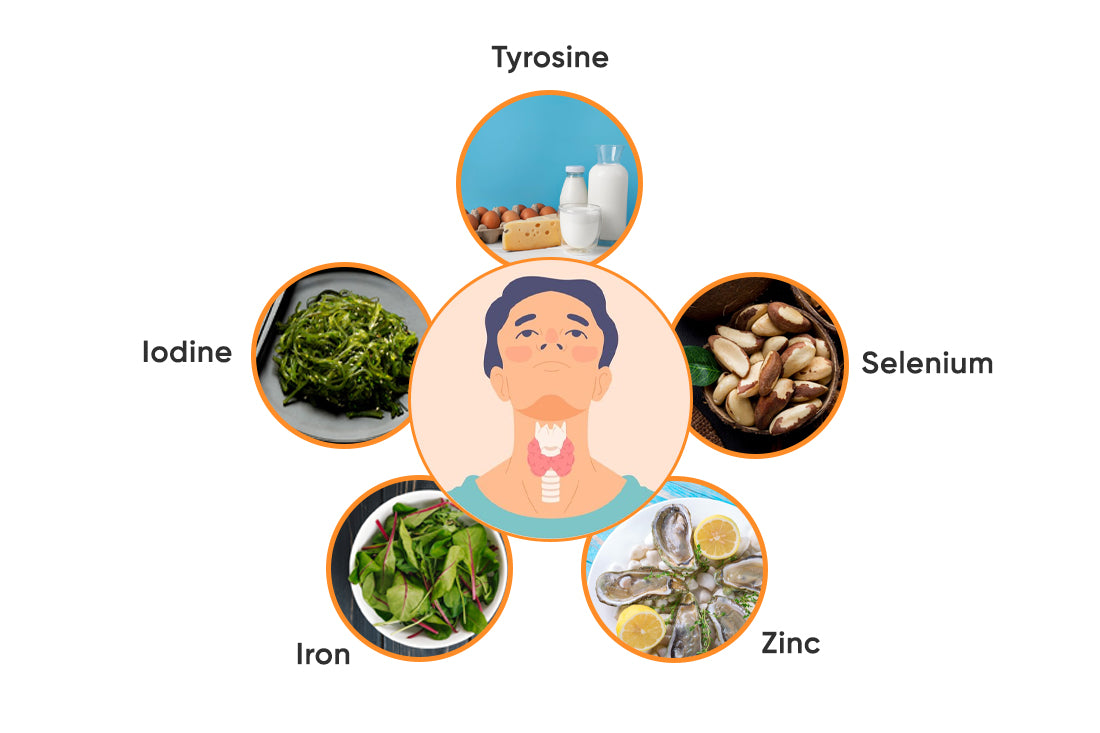Your thyroid gland is a small but powerful gland that sits at the base of your neck. It produces two hormones, triiodothyronine (T3) and thyroxine (T4), that regulate your metabolism, growth, development, and many other functions in your body. T4 is the inactive form of thyroid hormone, while T3 is the active form that your cells use.
However, your thyroid cannot work properly without the help of certain nutrients that are essential for its health and function. These nutrients are involved in the production, conversion, and utilization of thyroid hormones, as well as the protection of your thyroid from damage and inflammation. If you are deficient in any of these nutrients, it may lead to thyroid dysfunction, such as hormonal imbalance, weight gain, fatigue, hair loss, mood swings, and more.
In this blog post, we will discuss the most important nutrients for thyroid health and how you can get them from your diet or supplements.
Iodine
Iodine is the most well-known nutrient for thyroid health, as it is the main component of thyroid hormones. Your thyroid needs iodine to create T4 and T3, and without enough of it, your thyroid hormone production will be reduced. This can lead to hypothyroidism, a condition where your thyroid is underactive and does not produce enough hormones.
Iodine deficiency is a common problem worldwide, especially in areas where the soil and water are low in iodine. The recommended daily intake of iodine for adults is 150 micrograms (mcg), but some people may need more depending on their thyroid status and other factors. The best sources of iodine are seafood, seaweed, dairy products, eggs, and iodized salt. However, too much iodine can also be harmful, as it can interfere with the regulation of thyroid hormones and cause hyperthyroidism, a condition where your thyroid is overactive and produces too many hormones.
Selenium
Selenium is another key nutrient for thyroid health, as it is involved in the conversion of T4 to T3. Selenium is a cofactor for the enzymes that convert T4 into T3, the active form of thyroid hormone. Without enough selenium, your body will have less T3 and more T4, which can affect your metabolism and energy levels.
Selenium also protects your thyroid from oxidative stress, which is a type of damage caused by free radicals. Oxidative stress can harm your thyroid cells and trigger inflammation. Selenium can reduce oxidative stress and support your immune system, which can help prevent or treat thyroid disorders.
The recommended daily intake of selenium for adults is 55 mcg, but some people may benefit from higher doses of up to 200 mcg. The best sources of selenium are Brazil nuts, fish, shellfish, meat, poultry, eggs, and mushrooms.
Zinc
Zinc is another mineral that supports your thyroid function in several ways. Zinc is required for the production of thyroid-stimulating hormone (TSH), which is the hormone that signals your thyroid to create thyroid hormones such as T4 and T3. Zinc also helps convert T4 into T3, and enhances the uptake of T3 by your cells.
Zinc deficiency can impair your thyroid function and cause hypothyroidism, as well as other symptoms such as poor immunity, skin problems, and impaired taste and smell. The recommended daily intake of zinc for adults is 8 mg for women and 11 mg for men, but some people may need more depending on their thyroid status and other factors. The best sources of zinc are oysters, beef, lamb, chicken, pumpkin seeds, cashews, and legumes.
Iron
Iron is another nutrient that is essential for your thyroid function, as it is involved in the production and conversion of thyroid hormones. Iron is needed for the synthesis of tyrosine, which is an amino acid that combines with iodine to form T4 and T3. Iron also helps convert T4 into T3, and supports the transport of oxygen to your thyroid and other tissues.
Iron deficiency can affect your thyroid function and cause hypothyroidism, as well as other symptoms such as anemia, weakness, fatigue, and pale skin. Iron deficiency is more common in women, especially during menstruation, pregnancy, and breastfeeding. The recommended daily intake of iron for adults is 18 mg for women and 8 mg for men, but some people may need more depending on their iron status and other factors. The best sources of iron are red meat, liver, poultry, seafood, spinach, beans, and fortified cereals.
Tyrosine
Tyrosine is an amino acid that is a precursor of thyroid hormones, as well as other hormones such as dopamine, norepinephrine, and epinephrine. Tyrosine combines with iodine to form T4 and T3, and also helps regulate the mood and stress response of your body.
Tyrosine deficiency can affect your thyroid function and cause hypothyroidism, as well as other symptoms such as depression, anxiety, and low motivation. Tyrosine is considered a non-essential amino acid, as your body can make it from another amino acid called phenylalanine. However, some people may benefit from supplementing with tyrosine, especially if they have low levels of phenylalanine, iodine, or other cofactors. The best sources of tyrosine are meat, dairy products, eggs, soy, nuts, and seeds.
Conclusion
Your thyroid is a vital gland that needs various nutrients to function optimally and produce enough hormones for your body. By ensuring that you get enough iodine, selenium, zinc, iron, and tyrosine from your diet or supplements, you can support your thyroid health and prevent or treat thyroid disorders. You can also improve your thyroid function by avoiding foods that can interfere with your thyroid hormones, such as goitrogens, gluten, soy, and processed foods, and by managing your stress, sleep, and exercise levels.






